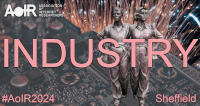RESEARCH GENAI: SITUATING GENERATIVE AI IN THE SCHOLARLY ECONOMY
DOI:
https://doi.org/10.5210/spir.v2024i0.14006Keywords:
Generative AI, research, academic publishing, scholarly economyAbstract
This paper charts the emergence of a distinct category of research-dedicated GenAI platforms, which we term Research GenAI or RGAI. These platforms are explicitly marketed to a cross-disciplinary academic audience, promising to automate research discovery and writing tasks, such as identifying/summarising published research, writing literature reviews, conducting data analysis, and synthesising findings. RGAI platforms (e.g., Consensus, Elicit, Research Rabbit, Scholarcy, Scite, SciSpace) are rapidly being adopted, in a context of experimentation, uncertainty, and controversy. We define the contours of Research GenAI by mapping the history and development of RGAI platforms and developing a preliminary typology of RGAI. We situate RGAI platforms within the scholarly economy and ongoing processes of platformisation and automation of academic work. We make a case for the need to understand RGAI platforms as complex sociotechnical systems that intersect with social, ethical, institutional, and legal questions, and demonstrate this approach through an STS-informed walkthrough of two notable RGAI platforms: Consensus and Elicit. In this presentation we present our findings generated from these walkthroughs and explore the implications of the technologies for the academic publishing industry.Downloads
Published
2025-01-02
How to Cite
Mitchell, . P., Riedlinger, M., Goldenfein, J., Snoswell, A., Burgess, J., & Witzenberger, K. (2025). RESEARCH GENAI: SITUATING GENERATIVE AI IN THE SCHOLARLY ECONOMY. AoIR Selected Papers of Internet Research. https://doi.org/10.5210/spir.v2024i0.14006
Issue
Section
Papers M

